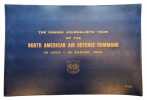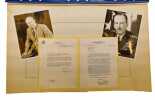3 books for « us air force »Edit
-
Topics
Army (2)
Aviation (1)
Military arts (1)
Technology (1)
Us air force (1)
War (1)
-
Countries
Belgium (1)
Denmark (2)
United States Air Force, 1e partie : U.S. Army Air Force.
Editions Aéronautiques Belges, 1945. 13 x 19, 38 pp., plusieurs illustrations, broché, état moyen bon état.
"PETERSON, VAL (US Ambassabor) (+) KUTER, LAURENCE S., (U.S. Air Force general and Commander in Chief of NORAD)
Reference : 60137
(1960)
The Danish Journalists’ Tour of the North American Defense Command 10th July – 12th August. - [THE DANISH JOURNALISTS' TOUR OF THE ""NORTH AMERICAN DEFENSE COMMAND"" 10TH JULY – 12TH AUGUST]
(USA), The North American Defense Command, 1960. Elephant Folio (765 x 515 mm). Large collection of photos with accompanying commentaries, in the custom made blue binding with gilt lettering to front board. 137 original monochrome photos (measuring 255 x 200 mm) pasted on to 40 leaves of paper documenting a month long trip to document the US Air Defense System from Copenhagen to New York, Washington, Chicago, San Francisco and, the main focus of the trip, Thule and Station Nord in the North of Greenland. Also inserted are two formal signed letters to chief editor of the Danish newspaper Fyns Tidende, Knud Madsen, 1) from Val Peterson, American Ambassador to Denmark, 2) from Laurence S. Kuter, U.S. Air Force general and Commander in Chief of NORAD. Both letters are thanking Knud for his time, for their close working relationship and for his understanding. Light wear to extremities and paper slightly browned in margin but otherwise in fine condition and all photos well preserved.
Exceedingly rare photo album - curated by the North American Defense Command with personal signed letters by Val Peterson, American Ambassador to Denmark and Laurence S. Kuter, U.S. Air Force general and Commander in Chief of NORAD - depicting the Danish journalists' tour of the North American Defense Command in the summer of 1960. The album is of the utmost scarcity and was only presented to a select few of the participants of the tour. The present collection is a testament to one of the most controversial and disputed chapters in the Danish-North American relationship, namely that of Camp Century on Greenland" this includes installation of a portable nuclear reactor, the first of its kind, and eventually the creation of a vast network of nuclear missile launch sites – information only declassified in 1996. Furthermore, it is a fine example of US-military Cold War propaganda and it they sought to influence the public opinion in allied countries. In 1951, the United States and Denmark - both founding members of the North American Treaty Organization (NATO) - signed the Defense of Greenland Agreement. The treaty was intended “to negotiate arrangements under which armed forces of the parties to the North Atlantic Treaty Organization may make use of facilities in Greenland in defense of Greenland and the rest of the North Atlantic Treaty area.” More simply put, the agreement allowed the United States to build military bases in Greenland. Denmark and the US had signed a formal agreement granting America the right to maintain military bases in Greenland, but only in strictly defined areas, such as Thule Air Base in Northwest Greenland. They still needed approval from the Danish authorities for all activities outside these defence areas. In 1957, without informing the Danish Parliament, the Danish Prime Minister H. C. Hansen gave the Americans permission to store nuclear weapons at Thule AB. When the US Army constructed Camp Century, completely with its own transportable nuclear reactor, the Danish Government found itself in a tight corner. As news about Camp Century spread due to the army’s publicity campaign, the Danish authorities were forced to explain that there were no nukes in Greenland. The Danes had to either give in entirely to the American requests to deploy various nuclear weapons in Greenland, or take a firmer stand against the Americans. Denmark opted for the second solution. In recognition of the unfavourable public climate in Denmark, the US military issued a press campaign to provide better understanding of the need for military bases in the Artic. This was primarily done by inviting chief editors from the major Danish newspapers on a month long trip to the US as is evident from the present photos, no expenses were spared. As ambassador Val Peterson wrote to Danish chief editor Knud Madsen in the accompanying letter:“From personal conversations with several participants in your tour, and from articles about the trip which already have appeared in the Danish press, I know that the various sponsoring agencies have done their utmost to make your visit instructive as well as pleasant. Above all, I am happy that you have had an opportunity to gain an insight in the vast effort made the the United States to safeguard the security of the free world and to maintain the peace, in close and cordial cooperation with our friends and Allies, Denmark prominently among them” And General Laurence S. Kuter: “We were delighted to have an opportunity to explain the important segments of our defense system to you – the NORAD Story. Denmark will continue to play a very important role in North American’s air and aerospace defenses in permitting important detection devices to be located in Greenland. Denmark is the only continental NATO power which provides such land-basing opportunity, which is essential for North America’s surveillance of the polar approach route. We hope, as a result of your visit, we now have a closer working relationship and understanding.” (From the accompanying letter). Over the next decade, the American military built three air bases in Greenland: Narssarsuaq, Sondestrom, and Thule. In context of the Cold War, these bases provided a refueling point and a base of operations for intermediate-range strategic bombers. Additionally, the United States deployed radar stations in Greenland to maintain a Ballistic Missile Early Warning System (BMEWS) and a Distant Early Warning (DEW) Line, which would give the United States advance warning of a Soviet nuclear attack. The Thule Air Base is the only of the three which is still operational today. Located less than 1,000 miles from the North Pole, it is the U.S. Air Force’s northernmost base. Construction on Camp Century began in June 1959 and was completed by October 1960. Army engineers first had to build a three mile road to bring the 6,000 tons of supplies it would require to build the $8 million facility. Most of the heavy equipment, including vehicles, were brought by bobsleds known as “heavy swings” which had a maximum speed of two miles per hour, making it a 70 hour trip from the Thule Air Base. The camp itself was not a secret. Officially, it was built for scientific purposes under the auspices of the Army Polar Research and Development Center. The Army even produced a short film promoting Camp Century as a “remote research community.” The facility did see some significant scientific discoveries, such as some of the first studies of ice cores, revealing geological secrets going back 100,000 years. Science, however was not the primary purpose of Camp Century. The facility was built primarily as a test for a military operation involving nuclear missiles. The U.S. Army continued to operate Camp Century in a limited capacity until 1966. Its tunnels quickly collapsed, and today the facility is unreachable, buried under a thick layer of ice. Project Iceworm remained a closely guarded secret until 1997, when the Danish Institute of International Affairs (DUPI) reported Camp Century’s military ambitions.
Italian and French Explosive ordnance.
Washington, United Stats Government printing Office, 1953. 4to. orig. printed wrappers. A stamp and written numbers on frontcover. On covers and all leaves ""Restricted. Security Information"".
On frontcover: Department of the Army technical Manual TM 9-1985-4 -.6. Department of the Air Force technical order TO 39B-1A-8.
 Write to the booksellers
Write to the booksellers




